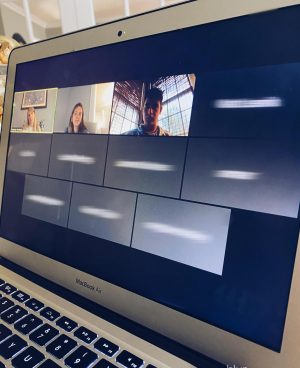Cameras On: Keeping it Face to Face
December 4, 2020
Teachers have pursued their passions because they love interacting with children. They live for the moments when a student’s eyes light up with pride and joy. They work towards shaping the minds of young children and leading them to greatness. They strive to inspire.
Mr. Kaplan, BHS history teacher, shares “it is an opportunity to make connections not only with your peers, but with your teachers who care about you. It is such a meaningful experience, and it is a huge part of why I love my job so much.”
Yet, none of this can happen the way it is supposed to amidst a global pandemic. Due to COVID-19, our school is currently all virtual, which means teachers cannot do the one thing they love the most. A recent issue that has surfaced due to virtual schooling is students’ tendency to keep their cameras turned off all class period.
Hybrid schedules are already difficult the way they are. As a student, turning off your camera can only be detrimental. Not having any expectations to meet leads to a tendency to slack off. When students turn their cameras off, no one is watching them, so naturally it is much easier to get distracted. 70.2% of twenty two teachers surveyed agree that it would be fair to mark students absent for having their cameras off and microphones muted the entirety of class. It is very common for students to use their phones and play videogames with their cameras turned off. They are able to do as they please when they can easily hide behind a screen with no supervision.
Mrs. Reitz, a history teacher at Bernards High School, shares how “they stay focused on the screen and engage with me more. I also believe that if your camera is on, it forces students to pay attention more naturally, so it is a good “study skill” honestly.”
Keeping your camera on replicates the most accurate learning experience that students have had in previous in-person years. With all these new adjustments and guidelines, it is difficult to keep the normality of school. Enforcing the habit of keeping cameras on all the time can only benefit students. They will grasp concepts easier, and their teachers can be more helpful.
Mr. Kaplan highlights the teachers’ daily struggles: “Without being able to see my students’ faces, it can be really hard for me to tell if my lesson is landing.”
Teachers shape their lessons around their students’ reactions and facial expressions. They are able to tell when a student needs further instructional support purely based on a students attitude and reaction. When teachers are talking to black screens, it is impossible for them to know whether they need to adjust their teaching styles.
Not only does this habit have a severely negative impact on students, but it also is insensitive and disrespectful towards the teachers. 78.4% of teachers surveyed admit that it is immensely more difficult to teach when the majority of their students turn their cameras off. This adjustment has been difficult for everyone, especially teachers. They created a life in this profession because they truly care about making a difference in their students’ lives. They chose to become teachers so they could create real and meaningful relationships with their students, but when they cannot meet in person, it is extremely difficult to have the same relationships.
English teacher, Mrs. Snyder, explains how greatly she has been affected by this upsetting decision; “My relationships with this year’s students aren’t nearly what they used to be. There is SO MUCH MORE to teaching than the content of our classes, and when cameras are off and mics are muted, I can’t be the teacher I want to be.”
Regardless of if students believe it is more convenient for them to turn their cameras off, they are not thinking of the effects their actions have on those who care about them most. Mrs. Reitz admits the frustration and sadness she feels when she cannot have the real teaching experience; “Then to sign on during class time and just see black screens it feels like no one cares. It makes me question why am I running myself into the ground if no one can even be bothered to turn a camera on to engage with me.”
Encouraging students to turn their cameras on is not a way for teachers to watch over their students like hawks. While it is a teachers responsibility to ensure that their students are understanding new material, teachers like Mr. Kaplan simply want to give their students the best experience possible. He explains how “it feels awkward making silly jokes into a black void of nothingness.” For a teacher like Mr. Kaplan, who lives for making his classroom truly enjoyable and safe along with creating meaningful relationships with his students, it is deeply upsetting to go through an entire school day without seeing all of his students faces. 89.5% of surveyed teachers agree that discussions would improve greatly if cameras were on.
“There were silly inside jokes that popped up organically, goofy moments during simulations, and real “a-ha!” moments during lessons. All of that is hard to re-capture in this setting when the conversation is between one man and 20 black boxes.” Under such strange and sudden circumstances, the smartest and kindest choice that students can make is to keep their cameras on for Zoom calls.


